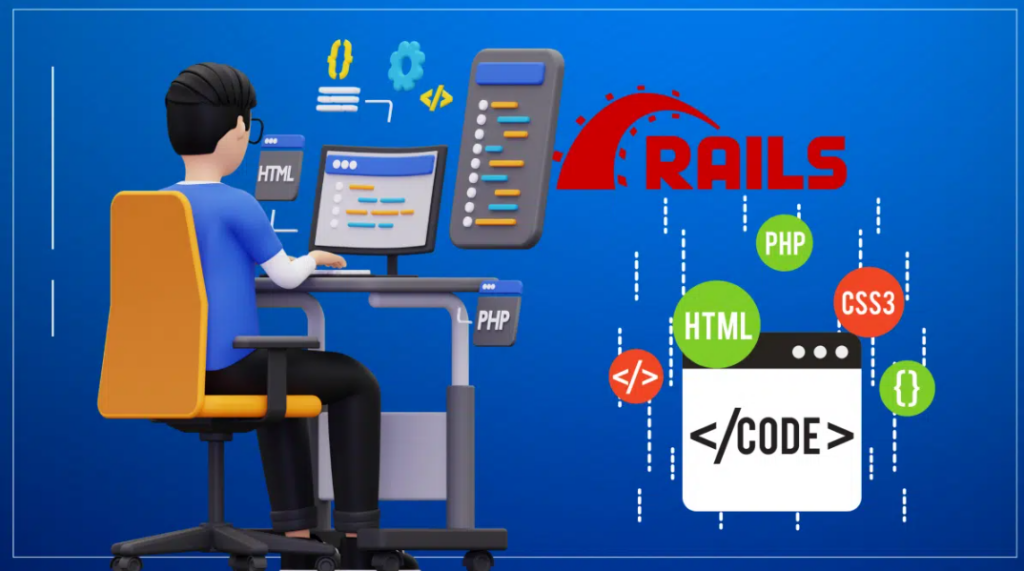
Outsourcing Ruby on Rails (RoR) development can be a game-changer for businesses looking to build efficient, scalable web applications without the overhead of maintaining an in-house team. However, ensuring a successful outsourcing experience requires a thoughtful approach and a well-laid-out plan. In this article, we’ll dive into 15 Strategies for Outsourcing Ruby on Rails professionals, ensuring a seamless and productive collaboration.
1. Define Your Project Scope Clearly: Strategies for Outsourcing Ruby on Rails

Clarity is the cornerstone of successful outsourcing. Begin by detailing your project’s scope with precision, outlining every aspect that needs to be addressed. Identify the core features and functionalities that your application requires and specify deliverables with timelines. This step ensures that your Ruby on Rails team has a shared understanding of what you want to achieve. Additionally, use visual aids like flowcharts or wireframes to represent your vision. By mapping out your expectations upfront, you not only set clear objectives but also minimize miscommunication and potential disputes. A well-defined scope also helps in resource planning, ensuring that your project stays within budget and on schedule.
2. Prioritize Experience with Ruby on Rails: Strategies for Outsourcing Ruby on Rails

When outsourcing Ruby on Rails development, prioritize expertise over cost-cutting. Developers or agencies with substantial experience in this framework bring more than just coding skills; they provide solutions refined by real-world challenges. Review portfolios to evaluate their competence in delivering similar projects. Additionally, check client testimonials or case studies to verify their credibility.
An experienced Ruby on Rails professional is adept at leveraging the framework’s powerful tools and can optimize your application for performance and scalability. By choosing seasoned developers, you not only reduce risk but also increase your chances of a smoother and more efficient project lifecycle.
3. Choose Between Freelancers and Agencies: Strategies for Outsourcing Ruby on Rails

Deciding between hiring a freelancer or an agency depends on your project’s scope and complexity. For smaller projects with limited budgets, freelancers can offer flexibility and cost-efficiency.
However, for larger or more intricate applications, agencies often provide a more structured approach. Agencies typically include project managers, designers, and QA specialists, ensuring comprehensive support. Analyze the pros and cons of each option based on your timeline, budget, and required expertise. Opting for the right outsourcing model ensures that your needs are adequately met without stretching resources or compromising quality.
4. Leverage Outsourcing Platforms: Strategies for Outsourcing Ruby on Rails
Outsourcing platforms such as Upwork, Toptal, and Clutch simplify the process of finding skilled Ruby on Rails developers. These platforms curate extensive talent pools with detailed profiles, ratings, and client reviews, helping you identify top-performing professionals.
Use advanced search filters to specify the skills, experience levels, and even location preferences that align with your project. Moreover, many of these platforms offer secure payment systems and mediation services, adding an extra layer of protection. By leveraging these platforms, you gain access to global expertise while reducing the risk of hiring unqualified candidates.
5. Conduct Rigorous Interviews
A structured interview process ensures you hire the right talent. Go beyond generic questions by diving into technical and project-specific inquiries. Ask candidates to describe their experience with Ruby on Rails, share how they’ve solved complex problems in past projects, and explain how they approach tasks like database optimization or API integration.
During the interview, assess their ability to communicate effectively and collaborate within a team. Strong communication skills are critical for aligning goals and minimizing misunderstandings. By conducting rigorous interviews, you gain deeper insights into each candidate’s technical prowess and cultural fit, which are key to a successful collaboration.
6. Evaluate Technical Proficiency Through Tests
Practical testing is an excellent way to validate a developer’s skills. Create coding challenges that reflect the complexity of your project, focusing on real-world scenarios they are likely to encounter. This can include building a sample Ruby on Rails module, debugging existing code, or optimizing an application for performance.
Pay close attention to how they approach the task, as it reveals their problem-solving skills and coding style. Developers who produce clean, well-documented code are easier to work with and save you time during future maintenance. By combining technical tests with interviews, you ensure that your chosen candidates meet both your technical and project-specific needs.
7. Focus on Communication Skills
Clear and consistent communication forms the backbone of any successful outsourcing partnership. Developers who can articulate complex Ruby on Rails concepts in simple, relatable terms ensure smooth collaboration throughout the project. Strong communication skills help avoid technical misunderstandings and enable productive discussions about requirements, challenges, and solutions.
To facilitate seamless interaction, implement tools like Slack for instant messaging, Zoom for video meetings, and Trello for task tracking. Establish regular check-ins to discuss progress, address concerns, and realign objectives as needed. Prioritizing communication skills in your outsourced team fosters transparency and strengthens your working relationship, ensuring your project stays on track.
8. Set a Realistic Budget
Budgeting is a critical factor in the outsourcing process, and setting a realistic financial plan ensures both cost-effectiveness and quality. Begin by understanding the average market rates for Ruby on Rails developers based on their expertise and location. Avoid falling into the trap of choosing the cheapest option, as it often leads to subpar results and higher long-term costs.
Instead, focus on finding developers who deliver excellent value for their fees. Account for potential additional expenses such as post-launch support or unanticipated scope changes. A realistic and well-defined budget not only helps you manage resources efficiently but also ensures the outsourcing team aligns their deliverables with your financial expectations.
9. Choose the Right Engagement Model
The success of your outsourcing project often hinges on selecting the right engagement model. Fixed-price contracts are ideal for projects with clearly defined requirements, offering cost certainty but less flexibility for changes. On the other hand, hourly-rate models allow for adaptability, making them suitable for dynamic projects that may evolve during development.
For long-term collaborations or complex applications, a dedicated team model provides continuity and focused attention. Evaluate your project’s needs, timeline, and scope to determine the best fit. By aligning the engagement model with your objectives, you create a structure that fosters efficiency, accountability, and successful outcomes.
10. Ensure Cultural and Time Zone Compatibility
Cultural and time zone differences can significantly impact the efficiency of your outsourced project. To mitigate these challenges, opt for a team with overlapping working hours, ensuring real-time collaboration when needed. Cultural compatibility is equally important, as it affects communication styles, problem-solving approaches, and team dynamics.
Look for developers who understand your business culture and are adaptable to your working methods. Use tools like World Time Buddy to coordinate schedules effectively, and establish clear expectations about response times and meeting norms. Ensuring compatibility in these areas strengthens trust, reduces friction, and enhances the overall working relationship.
11. Focus on Security and Data Protection
Security is a non-negotiable priority when outsourcing Ruby on Rails projects, especially if your application handles sensitive data. Ensure that your development team adheres to robust security protocols, including encrypted communication, secure coding practices, and regular vulnerability testing.
Verify that they comply with data protection laws relevant to your industry, such as GDPR or CCPA. Safeguard your intellectual property by having the team sign non-disclosure agreements (NDAs) before commencing work. Additionally, use secure platforms for sharing credentials and project data. By prioritizing security and data protection, you safeguard your business assets while building a foundation of trust with your outsourcing team.
12. Establish Milestones and Deadlines
Breaking your project into milestones makes it easier to track progress. Set realistic deadlines and review deliverables at each stage. This approach ensures timely completion and allows for feedback-driven improvements along the way.
13. Use Agile Methodology for Development
Agile development is highly effective for outsourced Ruby on Rails projects. It emphasizes iterative progress, collaboration, and adaptability. Agile tools like Jira and Asana can help manage sprints, prioritize tasks, and maintain transparency with the development team.
14. Monitor and Review Work Regularly
Stay involved in the project by regularly reviewing progress reports and deliverables. Monitoring helps identify and resolve issues early, ensuring the final product meets your expectations. Regular feedback sessions also keep the team motivated and aligned with your goals.
15. Plan for Post-Development Support
Outsourcing doesn’t end with project completion. Ruby on Rails applications require ongoing support for updates, bug fixes, and scaling. Discuss post-development services with your outsourcing team beforehand to avoid disruptions after launch.
Conclusion Strategies for Outsourcing Ruby on Rails
Outsourcing Ruby on Rails development offers unparalleled advantages, from cost efficiency to access to global talent. By following these 15 strategies, you can minimize risks, maximize returns, and achieve a successful outcome. Whether you’re building a startup or scaling an enterprise, outsourcing can provide the expertise and flexibility you need to thrive in today’s competitive digital landscape.